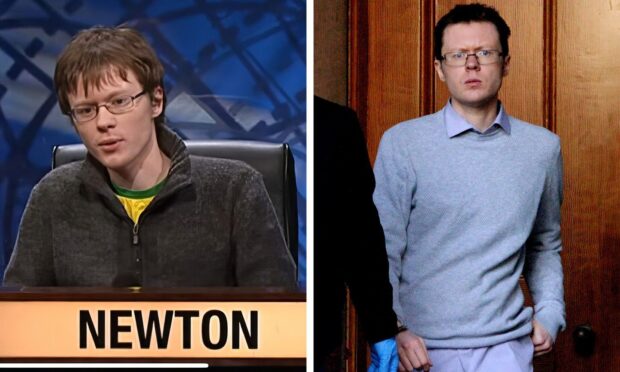A paedophile who once appeared on the BBC quiz University Challenge has asked appeals court judges to overturn his conviction for preying on young girls.
Andrew Newton, 31, was branded a “nasty perverted little spider” by a sheriff after he was convicted of sending indecent messages to girls as young as 12 and attempting to persuade them to meet him for sex.
The former St Andrews University maths student, who appeared on the long-running BBC quiz show in 2012, was later found by police to have accessed indecent images of children online.
Newton, of Broxburn, West Lothian, was handed a 16-month jail term by Sheriff Ian Cruickshank last July after being convicted by jurors following a trial in the Highland capital.
Passing sentence, Sheriff Cruickshank, who also placed Newton on the sex offenders register for 10 years, told him that the “worldwide web” provided platforms for communication, which should be safe spaces for children and teenagers.
The sheriff continued: “It can be a web where predatory spiders lurk, in order to reach out and trap children. That is what you are, you are a nasty, perverted little spider.”
On Wednesday, Newton addressed judges at the Court of Criminal Appeal in Edinburgh to argue he had fallen victim to a miscarriage of justice.
He told judges Lady Dorrian, Lord Matthews and Lady Wise that Sheriff Cruickshank didn’t properly explain the law to jurors in his closing directions.
Convicted sex offender claims sheriff made ‘misdirections’
He said the sheriff made a series of “misdirections” to the jury and claimed this could have resulted in him being wrongly convicted for his crimes.
Newton, who appeared from custody, said: “There’s a very real possibility of different verdicts being returned in this case if it wasn’t for the misdirections.”
He added: “There were ambiguities in the evidence in this particular case.”
Newton was convicted of describing sexual acts to a 12-year-old girl and attempting to induce her to meet him for sexual intercourse, as well as sending her an image of a penis.
Jurors also found him guilty of describing sexual acts and making indecent comments to two other girls, both as young as 14.
He asked one of them to send indecent images and tried to convince her to meet him for sexual intercourse.
During proceedings, his lawyer Graham Mann, told the court that his client was 23 at the time of the crimes.
The charges stated that Newton’s offending took place between 2016 and 2018 at locations in Inverness, elsewhere in Scotland and his home town.
The charges relate to incidents between 2016 and 2018, at an address in Woodlands Close, Inverness and elsewhere.
He also told Sheriff Cruickshank that his client had “never been in trouble before” and had found the court process “an extremely sobering experience”.
Passing sentence Sheriff Cruickshank spoke of how Newton had contacted the girls using a pseudonym and had subsequently consistently denied responsibility for the messages.
He said: “You contacted two of the girls and attempted to induce them to meet with you for sexual intercourse.
Pervert’s ‘high risk’ assessment
“You sent one girl a picture of a naked penis when she was 12 years old.”
Sheriff Cruickshank also said that a court-appointed social worker had assessed Newton as being at “high risk of sexual reconviction”.
Newton represented himself to appeal against his conviction and sentence during the 90-minute-long hearing on Wednesday morning.
Prosecutor Gavin Anderson KC urged the appeal court to reject the submissions made by Newton. He told them there was sufficient evidence available to show Newton’s guilt.
Mr Anderson said: “The Crown invites the court to refuse the appeal. I invite the court to conclude that a miscarriage of justice did not occur.”
Lady Dorrian, Scotland’s second most senior judge, said the court would issue its decision in the case sometime in the near future.
The Lord Justice Clerk added: “We intend to take time to consider the submissions, which have been made to us.
“Our decision will be issued in writing.”
UPDATE: On April 12 2024 judges at the Court of Criminal Appeal in Edinburgh accepted Andrew Newton’s arguments that he was the victim of a miscarriage of justice.

